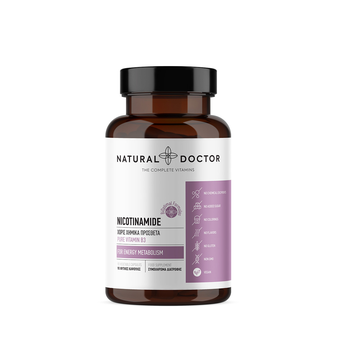From Fatigue to Fog: The Silent Signs of Nicotinamide Deficiency

Did you know that your body requires nicotinamide, a water-soluble vitamin, to function correctly?
Nicotinamide, or niacinamide or vitamin B3, is a water-soluble vitamin that plays essential roles in numerous physiological processes in the body.
Here is how it contributes to the overall health and wellbeing.
Energy Production
Nicotinamide is a precursor to nicotinamide adenine dinucleotide (NAD+) and nicotinamide adenine dinucleotide phosphate (NADP+). Those are coenzymes involved in cellular energy metabolism.
By participating in redox reactions, nicotinamide helps convert nutrients from food, such as fats, carbohydrates, and proteins, into energy for the body.
DNA Repair and Integrity
Nicotinamide plays a critical role in DNA repair mechanisms, helping maintain the genome's integrity and prevent mutations that can cause cancer and other conditions.
It supports the activity of enzymes involved in DNA repair pathways, such as poly(ADP-ribose) polymerases (PARPs), which help repair DNA damage caused by oxidative stress and other factors.
Skin Health
Nicotinamide has various beneficial effects on the skin. It helps regulate sebum production, making it helpful in managing oily skin and acne.
Nicotinamide also has anti-inflammatory properties, which help reduce redness and irritation linked with conditions like acne, rosacea, and eczema.
Additionally, nicotinamide supports the synthesis of ceramides, essential for maintaining skin barrier function and preventing the loss of moisture.
Protection Against UV Damage
Nicotinamide has protective effects against ultraviolet (UV) radiation-induced damage to the skin. It can reduce the risk of sunburn, DNA damage, and immune suppression caused by UV exposure.
Nicotinamide also supports the repair of UV-induced DNA damage and helps prevent the development of skin cancers.
Neuroprotection
Nicotinamide has neuroprotective benefits and may protect against neurodegenerative conditions, such as Alzheimer's, Parkinson's, and Huntington's disease.
It supports mitochondrial function, enhances neuronal survival, and lowers oxidative stress and inflamation in the brain.
Cardiovascular Health
Nicotinamide has been shown to benefit cardiovascular health. It helps regulate lipid metabolism, reducing LDL cholesterol while increasing HDL cholesterol levels.
Nicotinamide also supports endothelial function, reduces inflammation in blood vessels, and may help decrease blood pressure.
Anti-inflammatory Effects
Nicotinamide has anti-inflammatory properties as it inhibits the production of pro-inflammatory cytokines and chemokines and modulates immune cell function.
This makes nicotinamide potentially beneficial for managing inflammatory conditions arthritis, asthma, and inflammatory bowel disease. A deficiency in nicotinamide can lead to several adverse symptoms that can affect your overall well-being.
Determining if you are deficient in nicotinamide (niacinamide or vitamin B3) or any other nutrient typically involves assessing your dietary intake, recognizing deficiency symptoms, and potentially undergoing laboratory tests.
Here are some symptoms that may suggest a deficiency in nicotinamide:
- Fatigue or weakness
- Digestive problems, including diarrhea or abdominal discomfort
- Dermatitis, dry skin, or cracks around the mouth
- Memory loss or confusion
- Headaches or migraines
- Mouth sores or glossitis
- Pellagra (a condition characterized by a combination of dermatitis, diarrhea, and dementia)
Incorporating nicotinamide-rich foods into your diet or using nicotinamide supplements may help support overall health and well-being. If you're experiencing symptoms associated with deficiency, you must consult your doctor for proper evaluation and management.
Your doctor can determine the hidden cause of your symptoms, recommend appropriate dietary changes or supplements if necessary, and monitor your progress over time.
Like all other deficiencies, you can ensure optimal physical and mental health and prevent potential complications by taking action as soon as you suspect one.



